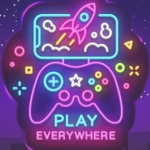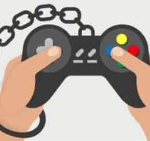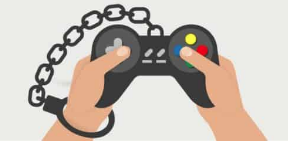Welcome back! Last week, we talked about Salt. If you missed that blog and would like to catch up, click HERE.

This week, we are going to talk about screen time. Do you ever wonder if you are spending too much time online? How would any of us know if we had reached our limit? Does our brain benefit from our time on social media? If so, how? Let’s grab a cup of coffee and have a chat.
Free Guy
The new movie “Free Guy” came out, and my husband, son and I went to see it.
Over the last year and a half, I had really, really missed going to the occasional movie. Our family has a long history of doing this as a treat. This movie was our first together, and it did not disappoint. I actually belly laughed twice. If you aren’t familiar, Free Guy is a movie about a computer program that is centered around global gamers and the coders that create the games they all play. This particular game included a special feature…the background characters could “evolve”. Artificial intelligence. What a concept, huh? Do you reboot the program? Do you destroy the servers? Is that ethical?
It really got me thinking…the players of these games get really invested. Many stay home from daily life in order to play. They don’t socialize outside of the game, some exclusively limit their social contact to other gamers. You see where I’m going with this, right? Is that healthy?
Is There An Evidenced Based Study Out There?
The University of Oxford reported that in November of 2020, an actual scientific evidence-based study was conducted and the results were a bit surprising. For the entire study, click HERE, but if you want the cliff notes, here they are:

Alex Castro
Contrary to many fears that excessive play time will lead to addiction and poor mental health, they found a small positive relationship between game play and affective well-being, but they were also quick to add that they couldn’t exactly show this without a smidge of healthy doubt thrown in. Baby steps. This is a hard one to study based on the fact that “well-being” means different things to different people.
The American Psychiatric Association Speaks Out
Globally speaking, the most contentious debates surrounding the potential effects of video game engagement are focused on the mental health of players. For example, the American Psychiatric Association did not identify any psychiatric conditions related to video games in the Diagnostic and Statistical Manual of Mental Disorders (DSM-5), but it does recommend Internet Gaming Disorder as a topic for further research.
The World Health Organization Adds Its Part
The World Health Organization adopted a more definitive approach and included Gaming Disorder in the International Classification of Diseases (ICD-11), emphasizing excessive play time as a necessary component.
Even The U.S. Food and Drug Administration Weighs In
In sharp contrast, the U.S.Food and Drug Administration recently approved the use of a so-called “serious video game” for the treatment of children with attention deficit hyperactivity disorder, providing some evidence that there are mental health benefits of some kinds of play time. These examples illustrate the central role video game engagement plays as a potential public health issue.
So how do we know if we’re falling down a rabbit hole or just having fun? Welp, I found a site that gives us some things to ask ourselves.
“Gaming Disorder”
I don’t know about you, but the term “gaming disorder” stood out for me. I wanted to know what the criteria were for this mental health diagnosis.
The DSM-5

The Diagnostic and Statistical Manual of Mental Disorders, Fifth Edition (DSM-5), which is published by the American Psychiatric Association, has a section dedicated to conditions that are being researched for designation as a mental disorder. Internet gaming disorder is one such condition, and it has a set of symptoms associated with it.
According to the DSM-5 (2013), there are nine symptoms of gaming addiction. You might have an addiction if, over a period of 12 months, you experience five or more of these online gaming addiction symptoms:
- Do you have a preoccupation with gaming and games?
2. Do you experience withdrawal symptoms when not playing?
3. Have you experienced the development of tolerance, or the need to spend longer amounts of time playing to get the same benefits and enjoyment?
4. Have you experienced unsuccessful tries to reduce participation in gaming?
5. Have you experienced a loss of interest in previously enjoyed activities and hobbies, and your sole focus is on gaming?
6. Have you continued playing despite knowing there’s a problem?
7. Do you use video games for escape or to get out of a negative mood?
8. Are you lying to others about the amount of time spent playing?
9. Have you experienced a loss of relationships, jobs, school performance, and/or other once-important aspects of life?
Ask yourself these questions. If you’re experiencing at least five of these symptoms, and they’re persistent, you might be addicted to gaming.
Consequences Lead To Help
You can also know if you’re addicted by looking at the consequences of gaming.
- Have you lost your job or been disciplined for being late or absent due to gaming?
2. Have you had trouble with relationships due to gaming? Lost friends, argued with a significant other, or experienced a reduced sex life?
3. Have you been caught in a lie around your internet use, resulting in a loss of trust from someone you cared about?
4. If in school, have your grades suffered?
Consequences often propel people to seek help so that they can regain control over their lives.
OK, I Recognized Myself In This Blog. How Do I Stop?

According to the Addiction Center: “The first step to ending video game addiction is to put the controller down and step away. This can be difficult, which is why many video game addicts made a successful recovery only when they discard their gaming equipment or go away on a wilderness retreat. A severe problem with video games might require drastic solutions. If you have questions about treatment for video game addiction, please contact a dedicated treatment provider today. A video game should not be the center of anyone’s life, but if it is, there is hope for getting unshackled from the screen”.
So there you have it, Dear Reader. While I don’t live with any gamers, I know and love many of them. Only they know where that line needs to be drawn.
Have a fantastic week, and we will meet here again next Wednesday to share another Cup of Coffee.
Editors note: This blog is not a replacement for sound medical advice, and many diseases, disorders, and syndromes have symptoms that overlap. Only a qualified medical professional can diagnose you. That said, if you think this blog may be helpful to others, please hit the Facebook Icon and share it on your personal pages. Thank you for reading us, we really do appreciate you!

1 Comment